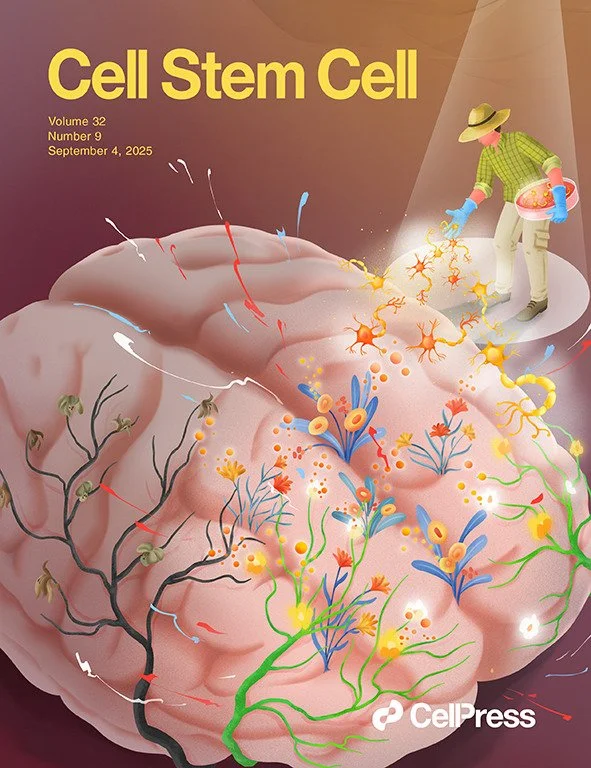Scientific Resources
-
Conferences, workshops, and training from the stem cell and regenerative medicine community. Learn more.
-
An international directory of organizations who make up our community. Learn more.
-
Cell Stem Cell is an affiliate, broad-spectrum journal of the ISSCR. Learn more.
-
The ISSCR identifies stem cell-related funding opportunities across many domains of biomedical research. The organizations and opportunities listed below are independent of any ISSCR programs or funding.
-
As a service to the field, the ISSCR develops guidelines that address the international diversity of cultural, political, legal, and ethical issues associated with stem cell research and its translation to medicine. The guidelines maintain and underscore widely shared principles in science that call for rigor, oversight, and transparency in all areas of practice. Learn more.
Meetings & Programs Across the Field
Please note, the ISSCR is not responsible for events listed, but provides them as a service to the field.
Have a suggestion for events, conferences, workshops, and training from the stem cell and regenerative medicine community we should feature? Fill out the form below to have the event considered.

-
The ASSCR is the peak body representing stem cell and regenerative medicine scientists in Australia and New Zealand. The ASSCR acts independently and as a hub of local societies, actively promoting stem cell/regenerative medicine research, education and policy development. The ASSCR holds an annual conference and professional development events for its academic, clinical and industry-based membership. The ASSCR is actively involved in community engagement and will co-sponsor the 2018 ISSCR Annual Meeting in Melbourne, Australia.
-
JSRM was established and succeeded the previous goals of the Cell Therapy Research Society. The society aims to advance medical research for beneficial techniques applicable to a clinical setting, and to contribute to human health by creating a breeding ground for cutting-edge, creative approaches and ground-breaking research. The Japanese Society for Regenerative Medicine hosts annual internal meetings as well as symposia open to the public.
-
KSSCR is an independent, non-profit organization established to promote and represent the stem cell research and networking across academic, industrial, clinical, and governmental sectors in Korea. Members consist of basic scientists, clinical and translational research scientists, as well as individuals engaged in regulatory issues for clinical applications. Since 2005, KSSCR has held annual meetings in summer and workshops in winter regularly every year.
-
SCSS is a non-profit organization seeking to serve the community with a threefold objective to bring together researchers, clinicians, health professionals, and companies that are interested in stem cells, to provide information about stem cell research to laypeople, and to provide a focus for all issues connected with stem cells. SCSS holds an annual symposium as well as a Seminar Series and offers travel awards to their members to attend the ISSCR Annual Meetings on a regular basis.
-
Stem Cells Australia brings together Australia’s leading academic researchers in bioengineering, nanotechnology, bioinformatics, stem cell biology, advanced molecular analysis and clinical translation with the aim to translate knowledge into innovative biotechnological and therapeutic applications in partnership with industry and other initiatives across the globe. This Australian Government funded research network holds an annual retreat for members and participates in the annual Australasian Society for Stem Cell Research meeting.
-
TSSCR aims to promote stem cell related research education and application through facilitating connections among local and international stem cell societies, assisting our government to establish stem cell therapy related regulations and promoting the collaboration among academics, clinics, industry, and government institutions. The organization holds annual national or international conferences and they award travel grants to students and post-doctoral fellows to attend the ISSCR Annual Meetings.
-
The NSCFA is a philanthropic foundation established in 2011. The NSCFA is dedicated to progressing cutting edge stem cell science in Australia through supporting promising researchers and projects, and educating the public about responsible stem cell treatments. Our governing board is drawn from diverse backgrounds in stem cell science, medicine, and finance. Each year the NSCFA supports early-career stem cell researchers by funding their attendance at national and international scientific meetings. In 2014 the NSCFA launched the Metcalf Prize, named in honour of the late Professor Donald Metcalf AO. The Metcalf Prize is awarded each year to two stem cell researchers (one male and one female) working in Australia. The Prize is judged by an independent scientific panel, and is valued at $50,000 to each researcher.
Global Directory of Societies & Networks
Asia Pacific
-
ABCD gathers scientists nation-wide, working in academic or non-profit research institutions covering the broad field of cell and molecular biology, spanning stem cell biology, organismal development and cell differentiation. ABCD organizes national meetings open to non-members as well as special interest group meetings in the field of stem cell and regenerative medicine.
-
The goal of the BeSSCR is to promote research on and with stem cells in the broadest meaning. The society will try to reach this goal by: BeSSCR
Networking - Offering a forum for interaction between researchers working on all different aspects of stem cell biology.
Promotion - Making the Belgian stem cell research known and promote it both within Belgium and internationally.
Collaboration - Promoting collaboration with other international stem cell networks.
Training - Offering training possibilities for stem cell researchers.
-
DASCS provides a broad and interdisciplinary focal point for researchers and professionals within the stem cell and regenerative medicine field in Denmark. The membership is comprised of both academia and industry. DASCS hosts an annual Stem Cell Symposium as well as various other events that are open to the public.
-
EuroStemCell unites over 400 European stem cell and regenerative medicine research laboratories in a coordinated effort to engage the public about stem cell science. As a partnership of scientists, clinicians, ethicists, social scientists, and science communicators, EuroStemCell provides independent, expert-reviewed information and road-tested educational resources on stem cells and their impact on society. EuroStemCell also works with people affected by conditions, educators, regulators, media, healthcare professionals and policy makers to foster engagement and develop material that meets their needs. The centre-piece of the project is a public-facing, multilingual website eurostemcell.org. EuroStemCell also facilitates both internal and open events and training sessions.
-
The FSSCR aims to bring together scientists working in all fields of Stem Cells in France. It is a non-profit association of 14 different institutions working on Stem Cells all over the country and it has three main goals: to promote French stem cell research by providing resources and organizing scientific meetings between its members; to bridge the gap between stem cell science and the general public through publications and by organizing outreach events and initiatives; to be a central source of accurate and reliable information on stem cells for regulatory agencies, the media, and the government.
-
The GSZ is an incorporated society that intends to build up a basis for supporting stem cell research and regenerative medicine and to assemble all scientists interested in this and related fields including biotechnology, genetics, cell biology, basic as well as applied sciences up to later clinical application. Members are made up of individuals from major universities and research institutions throughout Germany, Austria, Switzerland, Holland, and Belgium. The GSZ organizes an annual meeting where especially young stem cell researchers are given a forum to present their innovative results.
-
The central task of the GSCN is to pool the expertise in stem cell research in Germany and develop synergies between basic research, regenerative medicine, and pharmacology. The majority of the members work in public research institutes in Germany and research institutes and the GSCN also has research institutes, companies, and a partner association as members. The GSCN holds annual conferences that are intended for the scientific exchange and rotate among German cities.
-
The NCSCR is based in the Oslo area with member affiliations to the University of Oslo and Oslo University Hospital. The majority of members are academic or clinical with associate members from industry and patient organizations. The NCSCR is engaged in basic, translational and clinical stem cell research and maintains the National Core Facility for Human Pluripotent Stem Cells. It also organizes the Annual Norwegian Stem Cell Networking Conference each fall.
-
The Stem Cell Network North Rhine-Westphalia is a ministry funded non-profit association, who’s members more than 20 universities and clinics located in the federal state of North Rhine-Westphalia (NRW), Germany. More than 400 scientists from the member institutions are engaged in the network and are working in the field of adult and reprogrammed but also embryonic stem cells, including basic research, but as well have a strong focus on translational stem cell research. Moreover, the unique selling point of the network is the close link between biomedical research and the humanities, law and social sciences, which always has played a major role since the foundation of the network in 2002. Thanks to the support of the state of NRW the network holds a biannual International Meeting that is open and free to the public.
Europe
Middle East
-
The ISCS is a professional, non-profit organization which aims to promote the exchange of data on stem cell research and regenerative medicine in Israel. ISCS bring together researchers, clinicians, health professionals, and industry representatives and hosts, organizes and links academic activities nationwide. The ISCS holds regular meetings on scientific/clinical and technical aspects of stem cell research as well as an annual international stem cell conference and young investigator seminar.
-
CIRM is California’s stem cell agency. Our mission is to accelerate stem cell treatments to patients with unmet medical needs. We fund projects at all stages of the research pipeline, from basic research to clinical trials. Companies and institutions based anywhere can apply to fund portions of their projects conducted in California.
-
The New York State Stem Cell Science Program, NYSTEM, was launched in 2007 to support stem cell research across New York State. NYSTEM supports basic, applied, translational and other research activities to advance scientific discoveries in stem cell biology. In addition to supporting a range of research, NYSTEM supports infrastructure, scientific training, and educational initiatives. Since 2007, NYSTEM has issued 22 RFAs, and made 323 awards totaling $354 million to 35 New York institutions.
-
NYSCF is a non-profit organization with a mission to accelerate cures for the major diseases of our time through stem cell research. NYSCF combines the depth of a highly focused research institute with the breadth of a wide-ranging philanthropic organization, conducting research at it’s own independent laboratory in New York, funding postdoctoral fellowship and early career investigator programs, and collaborating with major medical research and leading academic institutions around the world.
-
Established in 2001, the Stem Cell Network (SCN) is Canada’s foremost research organization dedicated to enabling the translation of stem cell research from bench to bedside for the benefit of Canadians and patients worldwide. SCN has links to more than 30 Canadian universities and hospitals, supported 18 clinical trials, 16 start-up companies, incubated several international and Canadian research networks and organizations, funded 169 research groups, trained over 2,500 highly qualified personnel, and established the Till & McCulloch Meetings, Canada’s foremost stem cell research event.
North America
-
ABTCel’s mission is to promote, incentivize, and communicate research related to cell therapy and bioengineering, suggesting actions to maximize studies and exchange in these areas of scientific knowledge among professionals of public and private institutions, always conforming to ethical values. ABTCel puts on The Brazilian Congress on Stem Cells and Cell Therapy Meeting bi-annually.
-
Rede Nacional de Terapia Celular aims to generate scientific knowledge in the field of regenerative medicine by stimulating collaborations among researchers exchanging technological expertise about stem cells. The organization holds events every two years for members, who are made up of academics.
South America
To add your organization to this directory, contact us here.
Cell Stem Cell
Cell Stem Cell is an affiliate journal of the ISSCR. It is a broad-spectrum journal that covers the entire spectrum of stem cell biology. Topics covered include pluripotency and reprogramming, tissue-specific stem cells, differentiation, genomics and systems biology, stem cell niches, disease models, and clinical and translational insights.
Upcoming Funding Opportunities
-
Lasker Foundation Video Contest
Description: The contest invites early-career scientists and clinicians from the United States and around the world to showcase their passion for biology and medicine. Participants should demonstrate how their creativity and innovative thinking can help address some of the most pressing questions in these fields. The Contest aims to build skills in communicating important medical and scientific issues to broad audiences. The topic is announced annually in March, and winners are announced in mid-July.
Deadline: TBD
Funding Amount: $5000 USD
Website: Learn more here.
-
CRI Irvington Postdoctoral Fellowship Program
Description: The CRI Irvington Postdoctoral Fellowship is a three-year research training award designed to support early-career scientists working in immunology or tumor immunology/cancer immunology at nonprofit institutions worldwide. Applicants must already hold a doctoral degree (PhD, MD, or equivalent) by the start of the fellowship, and have fewer than 5 years of relevant postdoctoral experience at the time of award activation (for MD applicants, years of residency are not included).
Deadline: March 2, 2026
Funding Amount: ~$74,000 USD in year 1, ~$76,000 USD in year 2, ~$78,000 in year 3
Website: Learn more here.
-
Open
To post an upcoming funding opportunity, please contact us here.
Organizations with Recurring Funding Opportunities
-
A non-profit foundation established by the Federal Republic of Germany for the promotion of international research cooperation. Funding range includes Research Awards and Fellowships for applicants both abroad and from Germany. more
-
A national network that supports the expansion of scientific knowledge, expertise and methodologies across the fields of regenerative medicine and rehabilitation through education, training, research support, and funding opportunities. more
-
A leading research charity for dementia. Funds researchers in the UK working on all aspects of the translational pathway including basic research, early detection, risk factor identification, alleviation and progress towards effective treatments in Alzheimer’s and related dementias. International collaborations with UK-based lead researcher considered. more
-
Offering a range of research grants and career development grants. Research programs and funding. more
-
The BBSRC provides funding to scientists working in UK universities and in BBSRC-sponsored research institutes. Generally, researchers can apply at any time for funding for research that is within a committee's authority, preferably in priority areas identified by the committee. Studentships and fellowships are also available. more
-
Offers PhD Fellowships and PhD/Postdoc short-term travel awards. For research projects aimed to elucidate basic phenomena of human life. European citizens may be supported in Europe or overseas, non-European citizens receive support when working in Europe. Application deadlines for PhD fellowships: Feb. 1, June1 and Oct. 1. Travel Award applications can be made at any time. more
-
The British Heart Foundation is the major funder of basic and clinical cardiovascular research in the UK, with a series of research grant funding schemes at all levels. For details access the research pages on the BHF website. Applications accepted throughout the year. more
-
Funding for collaborative research and workshops. more
-
Funds basic and applied biomedical research focused on developing diagnostics and therapies and on other vital research opportunities that will lead to life-saving medical treatments. Grants are made only to California-based research institutions. more
-
Offers a wide range of funding opportunities to research scientists in Germany, for research training for German young investigators and for the promotion of scientific contacts between Germany and the research community worldwide. more
-
Offers awards and financial support for scientists at all stages of their careers that help to create an environment where researchers can achieve their best work. EMBO funding includes Fellowships, Young Investigator, Installation Grants, Course & Workshop Funding, Lecture Grants, Travel Grants, Gold Medal Awards, and Women in Science Awards. more
-
Promotes high quality science at a European level. Brings together scientists and funding agencies to debate, plan and implement pan-European initiatives. In particular, the Research Networking Programme on Regenerative Medicine (REMEDIC) offers travel grants, short-term visits and exchange visits to young investigators. more
-
Supports projects that pursue major global health problems. Each round of the Grand Challenges Explorations initiative will award grants against a set of specific topics. more
-
A non-profit organization that supports scientific research and education through its grants to individuals and institutions. Most HHMI grants are awarded through competitions that have a formal invitation and review process. more
-
Supports novel, interdisciplinary basic research focused on the complex mechanisms of living organisms for researchers in or from partner countries. more
-
To promote international scientific cooperation, the Japan Society for the Promotion of Science (JSPS) encourages highly qualified researchers from the world over to come to and conduct joint research activities with colleagues at Japanese universities and research institutes. Various fellowship programs are offered. more
-
Supports research worldwide with the aim to accelerate the cure and prevention of diabetes. A range of funding opportunities is available. more
-
The Leukemia and Lymphoma Society's research program aims to all scientifically sound approaches toward a cure or control of leukemia, lymphoma and myeloma worldwide. The Society supports basic laboratory research and its application to a clinical setting through a range of programs. more
-
The Maryland Stem Cell Research Fund (MSCRF) provides a variety of grant programs for human stem cell research conducted in the state of Maryland. more
-
The MRC is a national organization that promotes research into all areas of medical and related science with the aims of improving the health and quality of life of the UK public and contributing to the wealth of the nation. more
-
The National Blood Foundation awards grants annually for research that advances transfusion medicine and related biological therapies. This includes aspects of immunology, hematology, tissue and transplantation medicine, cellular therapies and related biological therapies, emerging infectious disease, immunohematology, donor health and recruitment and retention, and implementation of technological devices. more
-
The National Institutes of Health is the primary U.S. federal agency for conducting and supporting medical research. It comprises 27 institutes and centers and provides financial support to researchers within the United States and internationally. Many of the research grants are open to applications from international institutions. Research grants often run for several years, during which applications may be submitted at specified intervals. more
-
The National Science Foundation promotes and advances scientific progress in the United States by competitively awarding grants and cooperative agreements for research and education in the sciences, mathematics, and engineering. more
-
NWO promotes scientific research at Dutch universities and institutes through nearly 170 different research programmes and grants. Cooperation and exchange grants provide support for international travel and cooperative research. more
-
The New York Stem Cell Foundation supports translational stem cell research through grants to scientists working on stem cell research in the NYSCF laboratory or their own laboratories. The Medical Advisory Board advises on criteria for grants that are formatted along NIH guidelines and are consistent with NYSCF's mission. more
-
The administrative arm of New York State’s stem cell initiative, which has devoted $600 million to support stem cell research over 11 years, beginning in fiscal year 2008. more
-
The Royal Society runs a scheme of research appointments within the UK supporting outstanding talent and cutting edge research. International grants programme enables high calibre UK scientists to initiate collaborations, exchange ideas, develop new skills and experience from the world's leading researchers. List of funding or search funding available. more
-
The Stem Cell Network (SCN) is a catalyst for Canadian research that translates stem cell research into new therapies, commercial products and public policy. SCN research program is open to all Canadian investigators eligible to receive grant funding from CIHR, NSERC, or SSHRC. more
-
The Wellcome Trust is a UK-based organization that funds research to improve human and animal health. The Wellcome Trust supports research conducted outside the UK where research develops international partnerships, or focuses on biomedical or clinical medicine in developing countries. more










